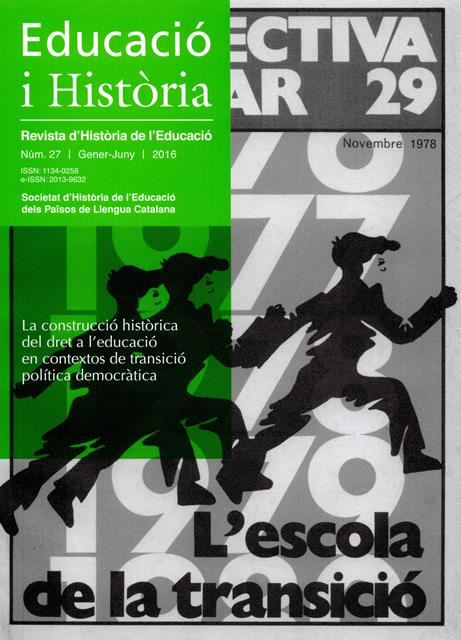L'Activitat docent en el desenvolupament dels municipis rurals de la província de València durant el tardofranquisme i la transició: el Patronat d'Educació Rural (1958-1985)
Article Sidebar

Main Article Content
Ignacio García Ferrandis
Xavier García Ferrandis
Amparo Vilches Peña
The provincial councils were an important element in the fight against illiteracy
in the rural population during late Francoism and the Spanish transition. In the
Valencian case, the Provincial Council created the Rural Education Board in 1958
with the aim of avoiding teachers from abandoning rural schools due to a lack of
incentives. The starting hypothesis of this study revolves around two axes. Firstly,
the Rural Education Board, owing to the prominence of rural teachers, was not only
able to contribute significantly to the educational development of school children in
rural areas, but was also able to act as a cultural catalyst of the population. In some
cases they were even able to improve aspects of the economy in some rural areas.
Meanwhile, the Board, guided by the involvement of teachers, was able to adapt to
the social, educational and political changes that took place in Spain during the democratic
political transition. In order to contrast our hypotheses we analysed historical
sources deposited in the Archive of the Provincial Council of Valencia. This researchconstitutes a historiographical novelty because it is the first time that the role of the
Rural Education Board of the Provincial Council of Valencia and its importance in
the literacy of the rural world in the province of Valencia has been analysed.
in the rural population during late Francoism and the Spanish transition. In the
Valencian case, the Provincial Council created the Rural Education Board in 1958
with the aim of avoiding teachers from abandoning rural schools due to a lack of
incentives. The starting hypothesis of this study revolves around two axes. Firstly,
the Rural Education Board, owing to the prominence of rural teachers, was not only
able to contribute significantly to the educational development of school children in
rural areas, but was also able to act as a cultural catalyst of the population. In some
cases they were even able to improve aspects of the economy in some rural areas.
Meanwhile, the Board, guided by the involvement of teachers, was able to adapt to
the social, educational and political changes that took place in Spain during the democratic
political transition. In order to contrast our hypotheses we analysed historical
sources deposited in the Archive of the Provincial Council of Valencia. This researchconstitutes a historiographical novelty because it is the first time that the role of the
Rural Education Board of the Provincial Council of Valencia and its importance in
the literacy of the rural world in the province of Valencia has been analysed.
Article Details
How to Cite
García Ferrandis, Ignacio et al. “L’Activitat docent en el desenvolupament dels municipis rurals de la província de València durant el tardofranquisme i la transició: el Patronat d’Educació Rural (1958-1985)”. Educació i Història: revista d’història de l’educació, pp. 135-58, https://raco.cat/index.php/EducacioHistoria/article/view/309640.